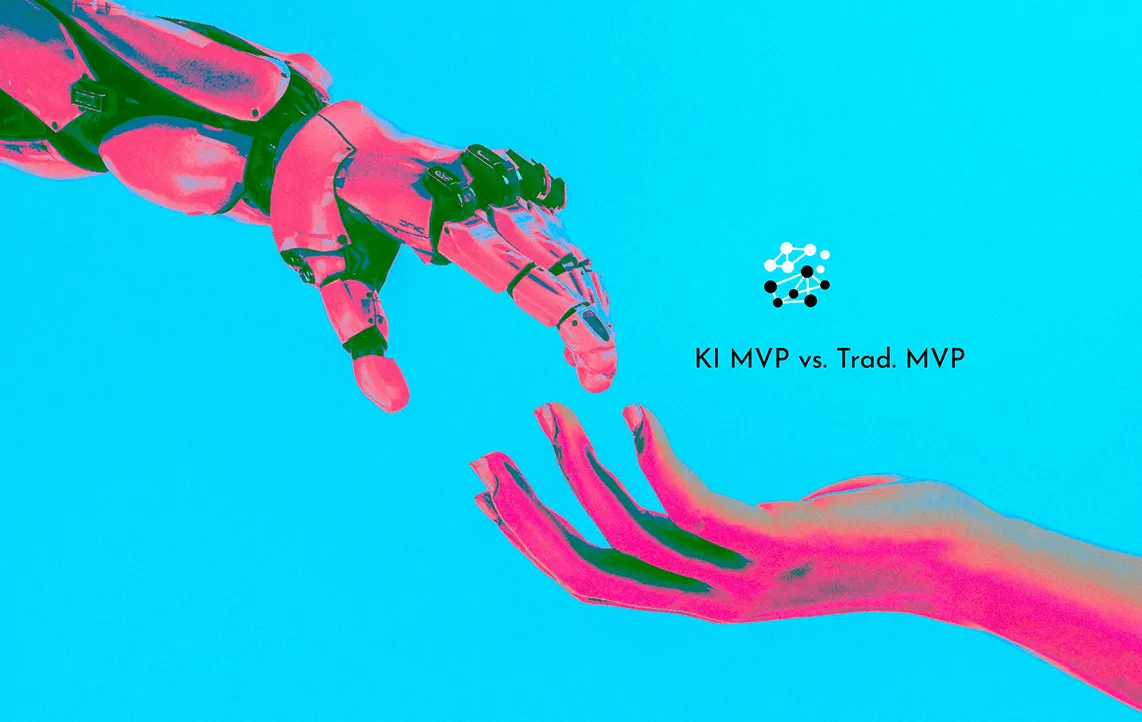

Updated:
May 12, 2025
Published:
June 19, 2024
AI MVP vs. Trad. MVP: Innovative Approaches in App Development | Knguru.de
In the world of App development The Minimum Viable Product (MVP) concept has established itself as a proven method for bringing a product to market quickly. Only the core functions are implemented and then feedback from users is collected, on the basis of which the business idea can then be further developed. However, with advances in artificial intelligence (AI), a new paradigm has emerged: the AI MVP. In this blog article, we compare the traditional MVP with the AI MVP, highlight the benefits of integrating AI, present case studies of successful implementations, and discuss the challenges of this innovative approach.
AI MVP versus traditional MVP: A comparison
Fundamental Approach
A traditional minimum viable product describes a simplified version of a product that offers just enough features to test the core idea. The focus is on the rapid launch of a functional version and the subsequent collection of data to validate the product idea. The product contains the most basic features that are necessary to make it usable and solve the main problems of the target group. Based on customer feedback, the product can then be optimized and expanded with additional functions.
On the other hand, an integrated KI MVP Artificial intelligence in the product right from the start. This means that machine learning, natural language processing, or other AI technologies are already included in the earliest version of the product. The goal of an AI Minimum Viable Product is to improve the user experience through intelligent automation, personalization, and data-driven insights.
Development process
The development of a traditional MVPs starts with identifying the core features that make the product minimally functional. A prototype is then created, which is brought to market and then iteratively improved based on user feedback. This approach makes it possible to implement a business idea with minimal effort.
In contrast, the development process of an AI minimum viable product is more complex. It starts with data collection and processing, followed by AI development and training. These models are then integrated into the product, which is then brought to market. Once launched, the performance of AI is continuously monitored and improved to increase its accuracy and efficiency.
Benefits of integrating AI with app MVPs
Integrating AI into app MVPs has numerous benefits:
- data analysis: Artificial intelligence makes it possible to analyze large amounts of data in real time, which can provide valuable insights into user behavior and product performance.
- Improved user experience: AI enables a high level of personalization by analyzing user data, understanding interactions and preferences, and thus enables the provision of individual recommendations or content. This significantly improves user retention and satisfaction.
- More efficient development: AI also allows the automation of tasks that would otherwise require manual intervention. As a result, time or resources can be saved efficiently, which leads to an increase in efficiency.
- Innovative advantage: Companies that integrate AI into their MVPs can set themselves apart from the competition through innovative features and services. This strengthens their position in the market and can open up new business opportunities.
- scaling: Finally, AI also facilitates scalability, as AI-based systems can react flexibly to growing numbers of users and volumes of data.
- Cost savings: Although initial investments in AI development can be high, automating many processes leads to significant cost savings in the long term. AI can take on repetitive tasks, which reduces the need for manual work and increases efficiency.
Case studies: Successful AI MVP deployments
The integration of AI into app minimum viable products is impressively demonstrated by case studies such as Spotify, Grammarly and Netflix:
Spotify (a music streaming platform) uses machine learning to analyze users' listening behavior and create personalized music recommendations from this. By creating tailor-made playlists, the music experience becomes individual and relevant, which increases user loyalty and satisfaction.
Grammarly (a writing assistant) uses artificial intelligence to analyze users' spelling and style. The platform offers suggestions for improvements that help users improve their writing skills and write more professional texts. By continuously analyzing and adapting to each user's writing style, Grammarly provides personalized assistance that goes far beyond simple spell checking.
Netflix (a streaming platform) uses AI to personalize movie and TV show recommendations. By analyzing user behavior, the platform can identify preferences and suggest appropriate content. This provides a personalized viewing experience and increases the likelihood that users will stay on the platform longer and discover new content that matches their interests.
Challenges of integrating AI into MVPs
- Data quality and availability: AI models require large amounts of high-quality data. Accessing such data can be a challenge, particularly in the early stages of product development.
- Complexity: Integrating artificial intelligence requires specialized knowledge and can increase development time and costs.
- Ethics and data protection: The use of AI raises questions about the privacy and ethical use of data. Companies must ensure that they comply with legal requirements and do not lose user trust.
- Technological Dependencies: AI development often requires specific technologies and infrastructure, which may require additional investments.
Conclusion: The importance of AI for future MVP projects
The integration of AI into minimum viable products represents a significant evolution in app development. While traditional MVPs continue to have their value, AI MVPs offer expanded opportunities for personalization, automation, and data analysis. The challenges of implementing AI shouldn't be underestimated, but the potential benefits make the additional effort worthwhile. Companies that use AI early on can secure a competitive advantage and offer their users more innovative and effective solutions.
The future of app development will undoubtedly be shaped by the use of artificial intelligence. By using the power of AI, developers can create more powerful and appealing products that meet the increasing demands of users.


Zwischen Agenturalltag und Startup - unser Blog
In unserem Blog teilen wir Tipps rund um das Thema Appentwicklung, Startups und einige verrückte Geschichten aus unserem Agenturalltag mit euch.
Book yours free Video call
Do you want to talk to our team about your project and just hear what we could do for you? Then simply book a free video call with us now!







.gif)
